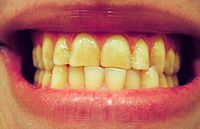
Photo from wikipedia
AFFILIATIONS 1 Sleep Laboratory and Unit for Chronobiology, Université Libre de Bruxelles Brugmann University Hospital 2 ULB312 Faculty of Medicine and ULB388 Faculty of Motor Sciences, UNI Neuroscience Institute, Université… Click to show full abstract
AFFILIATIONS 1 Sleep Laboratory and Unit for Chronobiology, Université Libre de Bruxelles Brugmann University Hospital 2 ULB312 Faculty of Medicine and ULB388 Faculty of Motor Sciences, UNI Neuroscience Institute, Université Libre de Bruxelles (U.L.B.) 3 Dept. of Internal Medicine, Center for the Study of Sleep Disorders CHIREC Edith Cavell Institute 4 Dpt. of Stomatology, Maxillofacial Surgery and Dentistry, Erasme University Hospital, U.L.B. 5 EXTO, Vrije Universiteit Brussel 6 LIFE, Royal Military Academy, Brussels, Belgium Our results evidence that SB can display degrees of altered sleep (i.e. lower efficiency, increased fragmentation) and confirm its common associations to comorbid sleep-related respiratory events or limb movements. SB patients do not only present with higher levels of daytime fatigue or potential sleepiness, but may also exhibit sleep quality impairments directly related to the total duration of bruxism occurrences. Beyond increased and abnormal teeth attrition, Sleep Bruxism (SB) may also directly impact sleep quality and related symptoms. We aimed at unraveling the existing relationships between nocturnal SB events (i.e. type, duration and sleep stage incidence) and structured clinical evaluations regarding sleep related daytime symptoms.
Journal Title: Sleep Medicine
Year Published: 2017
Link to full text (if available)
Share on Social Media: Sign Up to like & get
recommendations!